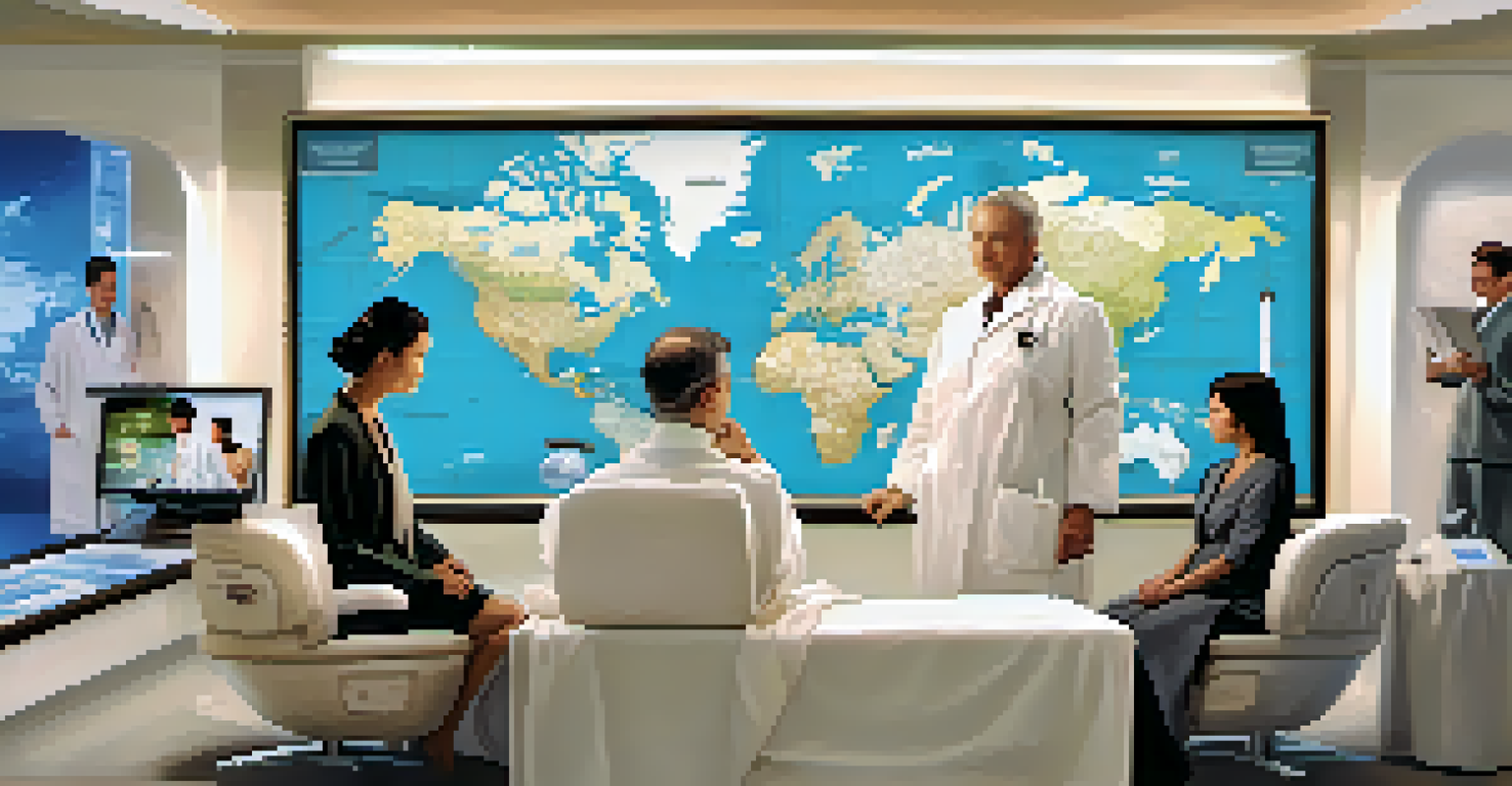Understanding Health and Medical Tourism: A Comprehensive Guide

What is Health and Medical Tourism?
Health and medical tourism refers to traveling to another country for medical care. This phenomenon has gained traction as patients seek affordable, high-quality healthcare options outside their home countries. In many cases, people choose to combine their medical procedures with a vacation, making it an appealing option for those looking to save money while enjoying new experiences.
Traveling for medical care can open up new doors for patients who seek quality and affordable treatment options.
The concept isn't new; people have traveled for health reasons for centuries. However, the rise of globalization, improved healthcare standards in various countries, and the internet have made this option more accessible than ever. Today, patients can easily research their options and connect with providers abroad.
Popular destinations for medical tourism include countries like Thailand, India, and Mexico, known for their advanced medical facilities and skilled professionals. These countries often offer procedures at a fraction of the cost compared to the U.S. or Europe, making them attractive to those seeking treatment.
Benefits of Medical Tourism
One of the main advantages of medical tourism is the potential for significant cost savings. Many procedures, from dental work to complex surgeries, can cost up to 70% less in certain countries. This affordability allows patients to access necessary treatments that may be financially out of reach at home.

In addition to cost, patients often benefit from shorter wait times. In countries with a high demand for healthcare services, waiting lists can be long. Medical tourism allows patients to receive timely care, which can be crucial for those with urgent health issues.
Affordable Healthcare Abroad
Medical tourism allows patients to access high-quality medical care at a fraction of the cost compared to their home countries.
Moreover, many medical tourists report a higher level of personalized care and attention. In some destinations, the ratio of healthcare providers to patients is lower, leading to a more tailored experience. This can significantly enhance the overall quality of care received.
Common Procedures in Medical Tourism
Medical tourism encompasses a wide range of procedures, from cosmetic surgeries to more complex operations like orthopedic or cardiac surgeries. Many people seek out cosmetic surgeries, such as breast augmentations, facelifts, and liposuction, due to the appealing price points and expertise available abroad.
In today's world, patients are empowered to make informed healthcare choices, breaking geographical barriers to access the treatment they need.
Dental work is another highly sought-after procedure among medical tourists. Patients often travel to countries like Costa Rica or Hungary for affordable dental implants, crowns, and orthodontics, all while enjoying a vacation. The savings can be substantial, making it a popular choice.
Lastly, fertility treatments and alternative therapies are also gaining traction in the medical tourism sector. Many couples seeking IVF or holistic healing methods look to destinations known for their progressive practices and success rates, enhancing their chances of successful outcomes.
Potential Risks and Considerations
While medical tourism has its benefits, it's essential to consider potential risks. One significant concern is the quality of care, as not all facilities abroad meet the same standards as those in developed countries. It's crucial for patients to thoroughly research hospitals and clinics, checking for accreditation and patient reviews.
Another risk involves post-operative care and complications. If a patient experiences issues after returning home, they may face challenges in accessing follow-up care from their local healthcare provider. Clear communication with both the overseas provider and local doctors is vital to ensure a smooth recovery process.
Personalized Patient Experience
Patients often enjoy shorter wait times and a higher level of personalized care in destinations with a lower provider-to-patient ratio.
Lastly, legal and ethical concerns can arise in medical tourism. Different countries have varying regulations regarding malpractice and patient rights, so understanding these differences can help prevent complications. Patients should always be aware of their rights and protections before undergoing treatment abroad.
Navigating the Medical Tourism Process
Navigating the medical tourism process involves several key steps, starting with thorough research. Patients should identify the type of procedure they need and find reputable destinations and providers that specialize in that area. Online forums, reviews, and recommendations can help narrow down options.
After selecting a destination, patients need to communicate with the healthcare provider for detailed information regarding the procedure, costs, and recovery expectations. Many medical tourism facilitators can assist with this process, helping coordinate everything from consultations to travel arrangements.
Finally, patients should prepare for their trip by ensuring all necessary documentation is in order, including medical records and travel insurance. Being well-prepared can significantly ease the journey, allowing patients to focus on their health and recovery while abroad.
The Role of Medical Tourism Facilitators
Medical tourism facilitators play a crucial role in bridging the gap between patients and healthcare providers abroad. These organizations help patients navigate the complexities of traveling for medical care by offering services like consultation, travel arrangements, and post-operative care support.
By partnering with accredited hospitals and healthcare professionals, facilitators can provide patients with tailored recommendations that align with their needs and preferences. They often have established relationships with providers, ensuring a smoother experience for patients.
Risks of Medical Tourism
While beneficial, medical tourism carries risks such as varying quality of care and complications with post-operative follow-up.
Furthermore, facilitators can assist with logistical challenges, such as accommodations and transportation, allowing patients to focus on their health rather than the stress of planning. This comprehensive support can make a significant difference in the overall experience of medical tourism.
Future Trends in Medical Tourism
The medical tourism industry is constantly evolving, with several trends shaping its future. One significant trend is the rise of telemedicine, allowing patients to consult with healthcare providers remotely before making travel plans. This can help patients make informed decisions and feel more confident in their choices.
Additionally, as technology advances, more healthcare providers are adopting innovative practices and treatments. This attracts patients seeking cutting-edge procedures that may not be available in their home countries. Enhanced technology can lead to improved outcomes and greater patient satisfaction.

Finally, the industry is becoming increasingly focused on patient safety and quality of care. As awareness of medical tourism grows, so does the demand for transparency and accountability. Patients are likely to seek out providers who prioritize ethical practices and maintain high standards, shaping the industry's landscape.